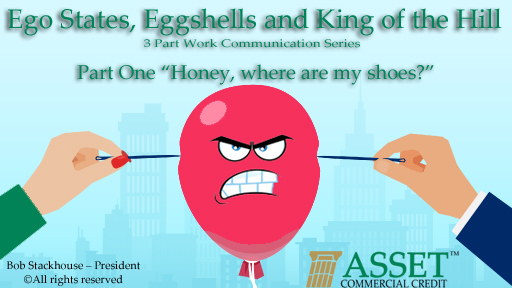Have you ever learned something that empowered you to help others throughout you career? I’ve gathered a few gems from my past and will offer them in a quick, easy to read series designed to help with managing people. Throughout my career, I’ve used this first story many times to help employees and friends who are having issues with others to find a productive path to solving their own communication issues.
It was in the late 1970’s and I was the Real Estate officer at a bank. My dad was the manager of a different branch of the same bank,. He shared with me a cassette tape of a speaker from a management conference he attended. The speaker was very dynamic and uplifting. I remember the speaker’s last name was Wilson. He told a story about communication that went something like this:
Husband: Honey, where are my shoes? (said innocently)
Wife: If you put your shoes where they belong, you’d know where to find them. (Said with sarcasm and tone!)
Husband: Up yours baby! (Said with great emotion!)
Mr. Wilson then went on to dissect the conversation like this:
Husband: Honey, where are my shoes? … is a question asked from the husband’s adult ego state.
Wife: If you put your shoes where they belong, you’d know where to find them … is a response from the wife’s parent ego state.
Husband: Up your baby! … is a response from the husband’s child ego state.
While this example uses unfair stereotypes that were predominant in the 70’s, it nevertheless causes the listener to grasp the concept of ego states. Nowadays I clarify that it can be either spouse in either role, matching the innocent gender to the person I’m talking to.
Mr. Wilson made the point that true communication only happens when both parties are interacting from their respective adult ego states. This is especially true a business supervisorial setting. His conclusion was if a party is in their child or parent ego state, find a way to hook their adult and only then deal with the problem at hand. Hook first, then resolve!
Since that time, the internet has exploded with information, including more depth about transaction analysis, ego state theory, personalities, behavioral science, and psychology. I’ve since learned that ego states is part of Transactional analysis that was formulated by American Psychiatrist Eric Berne in 1958.
If the concept that people are wired differently and have different needs, focuses and ingrained methodology in approaching life is of interest to you, then you may want to learn about Temperament Types. Please Understand Me by Keirsey & Bates is a good start. It explains Myers & Briggs Temperament Types and is one of many models that help people understand that we are all wired differently. Given our differences, understanding others helps one to get along with and even to motivate others. I highly recommend this reading.
If that reading gels with you and you are looking for even more interesting reading, I suggest Emotional Intelligence by Daniel Goleman. Goleman delineates the five crucial skills of emotional intelligence, and shows how they determine our success in relationships, work, and even our physical well-being. Truly, understanding others is critical to meeting the needs of employees and providing employee satisfaction. Of course the company will benefit from more productive, quality work in the process.
It must be said that no one has all the answers to every situation but when your core value is to create an “everybody wins” objective, then paying attention to solving communication issues becomes important. We welcome the opportunity to add value to all our relationships and hope this information helps you.
Bob Stackhouse – President, Asset Commercial Credit




